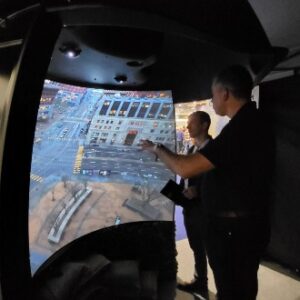What do you see through AR in AV?
The idea of augmented reality (AR) glasses has been around for years, but so far, they haven’t been designed in a way that makes them usable for consistent use, especially on the job. That may change in 2023 with releases of new AR headsets and glasses. These tools could change the way AR fits into AV and operate by allowing workers to continue to use their hands while accessing information.
On episode 25 of the XR Star podcast, titled “Reality Under a Different Lens,” host and futurist Amelia Kallman speaks with Jonathan Nelson, the Strategic Sales Manager for Vuzix. The two discuss the value and potential of AR technology and what may be on the horizon.
“The Perfect Balance Between Performance and Comfort”
Vuzix is a pioneer in wearable technology and augmented reality, and it’s been in the industry for over 25 years. Nelson calls the glasses “the perfect balance between performance and comfort.” While some AR glasses may feel awkward to wear, the glasses Vuzix makes feel more natural. When describing the brand’s Blade 2 glasses, he says, “You put them on, and all of a sudden you have assisted reality right in front of your eyes. They are really, really straightforward and simple to understand and for people to really engage and work with.”
Vuzix debuted its Ultralite glasses at the 2023 Consumer Electronics Show (CES). Nelson describes the Ultralite as a complete upgrade, with a new chipset, increased battery capacity, and an update from Android 5 to Android 11. The fashion-forward Ultralite is also the company’s first foray into creating AR glasses that also work for the consumer market.
AR Glasses in Industry
Currently, the majority of Vuzix’s customers are industry customers. “Take medical, for example,” Nelson says. “We’ve got Vuzix’s glasses being used in intensive care units where the staff can share a live video and test results with an attending physician, who can then evaluate that patient’s condition. They can provide some instructions, and all from a location pretty much anywhere in the world and in real time.”
It’s not just the medical industry getting a boost from AR. Nelson also explains that the glasses can be used by engineers and repairmen. For example, say one of your AV systems break, and a technician comes out, but they’re not trained on that particular model. “They can pop a pair of glasses on, dial into one of the more experienced engineers or a central control room, and have that person talk them through repairing that appliance,” Nelson says.
Maintaining Security and Privacy With AR
Since Google Glass first appeared on the scene, there’s always been a concern about maintaining security and privacy with AR glasses.
“We take security very, very seriously,” Nelson says. He explains that Vuzix has put a lot of thought into keeping its customer information secure, with technology like Qualcomm Trusted Execution Environment, secure file systems, and full disc encryption. “Security is a huge concern, and that’s something where our devices do tick all of the boxes for their requirements for hardware,” Nelson explains.
Enhancing People, Not Replacing Them
With any sort of AI technology, there comes a fear that the new technology might replace actual human beings.
“It’s obviously a very valid concern,” Nelson says. “We very much are more about enhancing human interaction and supporting human interaction rather than replacing it. Our goal is to try and make people more efficient.”
He gives the example of a warehouse worker who, when given a pair of AR glasses, can perform their job at the same level as someone much more experienced. “It’s enhancing on-the-job training,” Nelson explains. “It’s taking people who are quite new, giving them the confidence to be able to go out there and tackle these jobs and learn these jobs without having to watch somebody else do it.”
The Future of AR Glasses in AV
Will AR glasses ever replace devices like smartphones? Nelson isn’t so sure. “The smartphone has become so ingrained in us,” he says, but he points out that certain applications, like maps, could be much easier to use on glasses rather than a smartphone. The glasses may reduce the use of smartphones eventually, and they also allow you to choose how much augmentation you want in your day.
Nelson hopes that AR glasses will allow people in AV to work smarter and more efficiently from anywhere in the world. In fact, his biggest fear is that companies won’t utilize the glasses to their full potential.
Final Thoughts
Massive strides have been made and continue to be made in the augmented reality space thanks to companies like Vuzix. While primarily used in industry, AV glasses have the potential to change the way workers and everyday consumers alike interact with the world.
XR Star is a monthly podcast that focuses on mixed reality and its impact on art and AV. You can find all the past episodes on AVNation. To get in touch with Jonathan Nelson, find him on LinkedIn.










